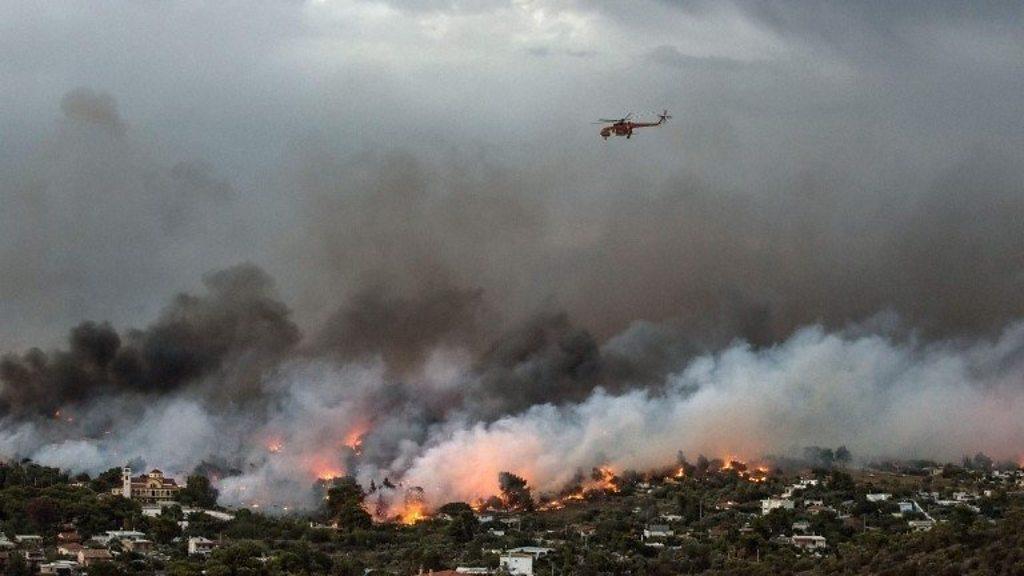Greek wildfires: Drivers 'sent into path of blaze by police'
- Published
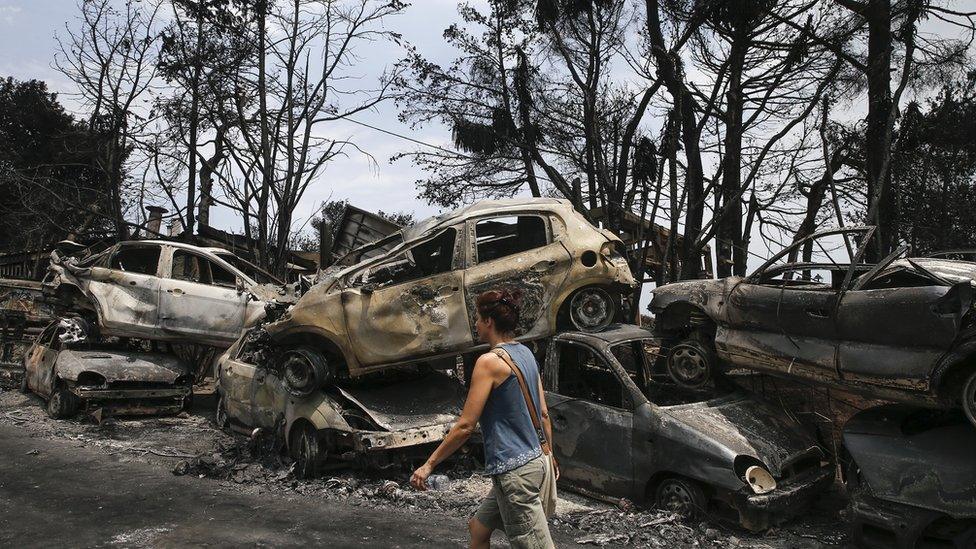
Many lives were lost when drivers were unable to escape the narrow streets by the coast
More than a week after the deaths of at least 91 people in wildfires on the Greek coast, a catalogue of errors by local authorities has emerged.
Police set up diversions for drivers that sent them into the path of the fire, according to one senior expert.
A separate study has found that no alarm was raised and residents and tourists had no chance to flee.
The authorities' handling of the fire has already been widely criticised by residents caught up in the disaster.
The Greek government blamed arsonists for causing the fire and has accused some residents of obstructing escape routes in the town of Mati by building illegally.
Traffic jams and panic
One of the most devastating images in Mati was of dozens of burned-out cars a short distance from the coast. According to Prof Vassilis Digalakis of the Technical University of Crete, cars were unwittingly sent into the area by police.
Instead of turning cars back on the main road, Marathon Avenue, police created diversions and sent drivers heading both south and north towards the area about to be devastated by the fire, he told the BBC.
"Obviously they had to stop the traffic on Marathon Avenue as the cars would have run into the fire," he said.
"But instead of blocking the traffic and ordering the drivers to make a U-turn, they allowed them to seek alternative routes - and the only routes were through Mati."
A police Facebook post went up on 23 July, a short time before police diverted traffic. It listed three diversions from Marathon Avenue and a fourth, close to the fire itself in Kokkino Limanaki. The message was also posted by the Civil Protection directorate.
Allow Facebook content?
This article contains content provided by Facebook. We ask for your permission before anything is loaded, as they may be using cookies and other technologies. You may want to read Meta’s Facebook cookie policy, external and privacy policy, external before accepting. To view this content choose ‘accept and continue’.
Dozens of people died as they tried to get out of their cars and flee.
"At that time there was no way out. And if you look at the pictures of burned cars, you'll see they're still blocked in every direction," said Prof Digalakis..
His remarks are backed up by a separate preliminary report by a team from the University of Athens which says efforts to evacuate Mati were disorganised and caused traffic congestion and panic.
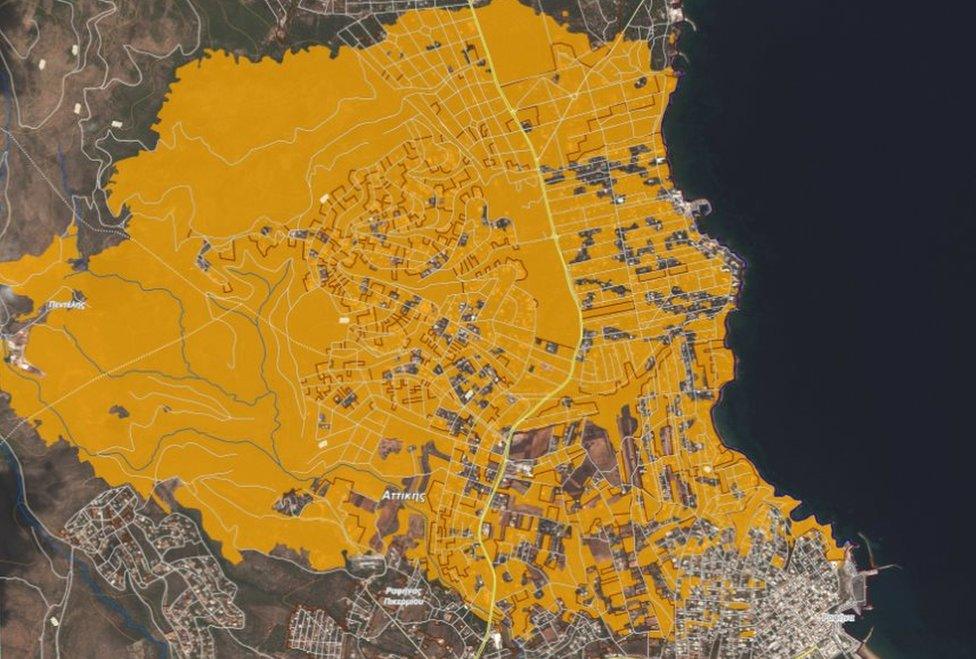
This satellite map from Copernicus shows the scale of the fire damage in the area around Mati
There was no official alert for residents and tourists close to the beach, but only by word of mouth from people escaping the western outskirts of Mati, it says. They had almost no time at all to react.
The fire took barely 30 minutes to cross Marathon Avenue and reach the coast on 23 July, amid westerly winds recorded in the area of up to 120km/h (74.5mph).
A total of 305 cars were burned amid temperatures so high that aluminium wheel rims and car windows melted.
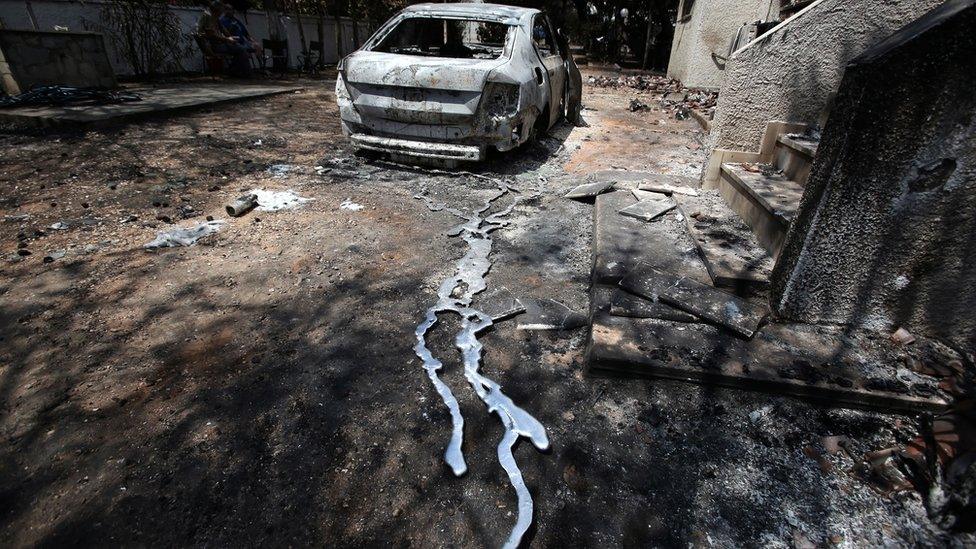
The fire raged so fiercely that aluminium and glass melted from cars
The university team said that a lack of town planning in Mati had acted as a trap, external for people trying to escape. They highlighted the narrow streets, dead ends and a lack of open spaces that stopped residents getting away.
Last week, Defence Minister Panos Kammenos said illegal construction by residents had contributed to the disaster by blocking escape routes.
Greek fires: Survivors confront defence minister over response
No resignations, so far
So far the bodies of 76 people have been identified among the remains of victims recovered from both land and sea. Funerals have been held for some but several people remain unaccounted for.
The families of a couple in their 70s killed in the disaster have sued police, fire, civil defence and regional leaders for their handling of the disaster.
They allege that no officials from the Marathon area or from the emergency services alerted residents, gave orders to evacuate or proposed evacuation routes.
Among those criticised for their response to the fire emergency is Civil Protection chief Yannis Kapakis, who went on national TV four days before the fire to insist that preparations were at a very high level both at land and sea.
The Greek government's response to the fire prompted opposition conservative leader Kyriakos Mitsotakis to call for those who had political responsibility to resign, as well as those who had the task of organising the response to the fire.
"I really wonder how some people... can sleep today, and carry on happily exercising their duties," he said on Tuesday.
"The flames were chasing us into the water" - survivor
His remarks were widely assumed to be targeted at Prime Minister Alexis Tsipras's handling of the crisis. One minister has offered to resign but Mr Tsipras did not accept it.
The left-wing leader's office accused Mr Mitsotakis of trying to take advantage of the tragedy.
Mr Tsipras visited the scene of the fire on Monday unannounced, avoiding Greek media but also angry protests.
In contrast, President Prokopios Pavlopoulos visited the coastal area on Wednesday and talked to survivors and emergency services but asked TV crews not to accompany him in advance.
- Published26 July 2018
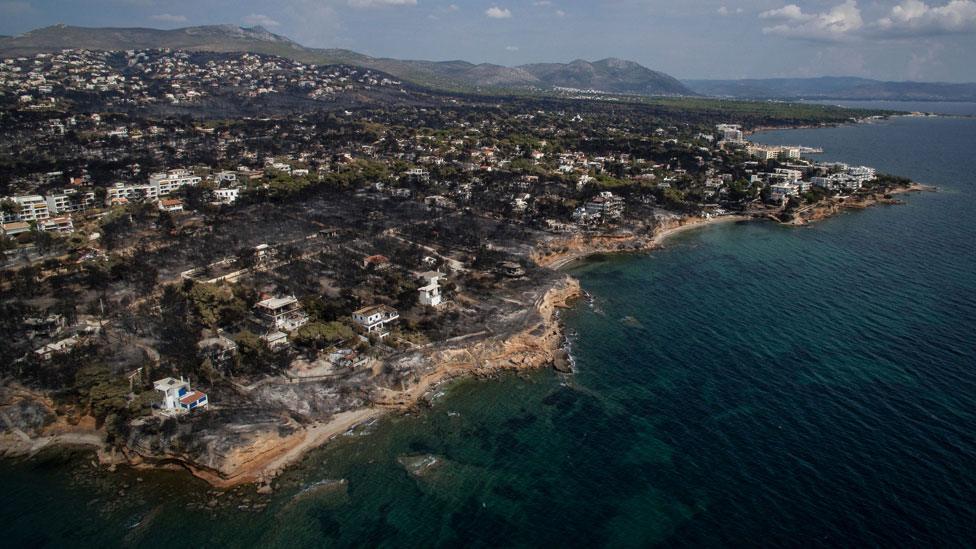
- Published24 July 2018
